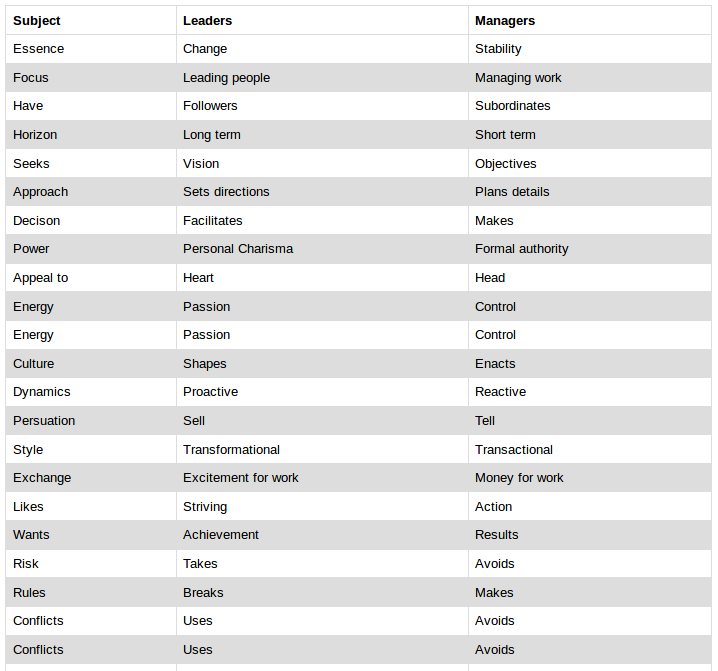Leadership Vs Management Debate

Debate between Leadership and Management has been raging for a numbers of years. A distinction between the two concepts is very crucial and inherent to help make the difference. This will go a long way to enable each one of us to reflect on our own behavior and start asking the magic question: Are we really leading? It is worth highlighting that there are two fundamental organizational tasks:
- Executing Existing Tasks (Management) and
- Devising New Directions (Leadership).
Does this mean that anybody devising new directions is a leader? Certainly not, I beg to say. This is because there are two types of new directions:
The first is doing something completely new – new products, new services, new delivery systems etc (leadership).
The second is doing the same thing only better – improving quality, efficiency, customer service, etc (a kind of mixture of leadership and management). This is called process leadership.
I am not an expert in the management and leadership thematic, but I humbly wish to attempt a definition of these great terms for better understanding of this article.
- Management: Getting things done through other people and with people.
- Leadership: Influencing others to engage in a work behavior necessary to achieve goals.
The biggest difference I wish to highlight here is the way managers and leaders motivate the people who work with (management) and/or follow them (leadership).
As entrepreneurs (that is people who think critically and act differently), we should realize that there are business leaders and there are business managers. While some leaders are managers and some managers are leaders, many times leaders and managers are very different “animals”. Therefore, irrespective of the fact that we are founders and CEOs, we are movers and shakers of our respective industries, each and every one of us has to self-situate in one of these categories - management or leadership?.
All too often we fail to recognize these differences in our organizations’ day-to-day operation (not without consequences). For there is a price for everything.
I remember when I facilitate business workshops or present a paper on Customer Service, I always emphasize on the Ten Commandments of Customer Service. The simple reason is because, as Christian, we might not see the consequences of the ills we commit immediately simply because God is giving us another chance to repent. But hey! As entrepreneurs when we make any wrong move about the day-to-day operations of our businesses (profit or non-profit making) the consequences stand up tall just in front of us.
The only way out here is becoming a leader and not a manger, this is inevitably what is needed to run businesses in the 21st century.
Remember that “everything rising and falls on leadership” It is for this reason that I suggest the following differences between managers and leaders so that it can serve as keynotes to guide us as entrepreneurs:
Leaders :
-
Have followers (which is most of the time voluntary),
-
Have charismatic, transformational style,
-
Followers will follow in spite of risks,
-
Easily attract people to their cause,
-
Promise transformational benefits,
-
Are people focused – always good with people,
-
Are achievement-focused – enthusing others to work towards their vision,
-
Seek risk – Leaders are risk seeking though managers are risk-averse,
-
Consider it natural to encounter and overcome risks along the way,
-
Are comfortable with risks and seek ways to avoid them including breaking rules in order to get things done.
-
Are (good ones) excellent and loyal followers.
Surprising number of leaders had some form of handicap in their lives which they had to overcome (traumatic childhood, dyslexia, short) which perhaps taught them the independence of mind needed to go out not worrying about what others are thinking about them.
Managers :
-
Have subordinates
-
Authoritarian, transactional style
-
Have a position of authority vested in them
-
Subordinates work for them and largely do as they are told.
-
Management style is transactional – they tell their subordinates what to do and subordinates do this not because they are a blind robot, but because they have been promised a reward (at minimum their salary) for doing so.
-
They are work focus
-
Are paid to get things done (they are subordinates too) often within tight constraints of time and money.
-
They naturally pass on this work focus to their subordinates.
-
Seek comfort
-
An interesting research finding about managers is that they tend to come from stable home backgrounds and led relatively normal and comfortable lives.
-
This leads them to be relatively risk-averse and they will seek to avoid conflict if possible.
-
In term of persons: they generally like to run a “happy ship”
The following table (picture) can help summarize the differences between leaders and managers

TRANSFORMING MANAGERS INTO LEADERS
-
To empower and inspire Founders and CEOs to become leaders, go beyond hiring people with only fundamental management skills.
-
Go for candidates who exhibit a great deal of character and posses above-average leadership qualities in addition to management skills.
-
The Challenge – where to find them.
-
We must be able to recognize them when they are sitting before us.
-
What to look for in management candidates: (leadership qualities, leaders with a vision who are able to communicate vision to others, leaders having integrity more concerned with doing the right thing rather than what is expedient. Integrity is essential for a leader to have followers).
-
Leaders must understand that trust is a two-way street.
-
They must trust in themselves and their employees and they must earn their employees trust.
-
Leaders show their loyalty to the employees, the managers and the company as a whole to earn the loyalty of the employees.
CONCLUSION
Leaders
-
That leaders and managers, though looking similar, are in fact, two very different “animals.”
-
That the leaders create new systems and the vision to see something new, something beyond the status quo;
-
That leaders think outside the box which could move mountains.
Managers
-
Managers make decisions, solve problems as they arise and give orders;
-
Managers maintain command and control, many a time to excess, thereby uninspiring employees;
-
Managers maintain the status quo and seek to make it more efficient
RECOMMENDATION
-
That in view of the growth (actual and envisaged) of Founders, CEOs and their organizations, they should seek to transform present managers into leaders;
-
That organizations should recruit employees with strong leadership potential who will eventually become a blend of leaders and managers;
-
That organization should encourage its managers to think out of the box and break new grounds for the institution.
Note: This write-up is not original from me. I am still struggling with identifying the author. Since we are professionals at Probe Write, plagiarism is what we hate.
Similar Post You May Like
-

3 things that will make you realise you are a Conspiracy Theorist
A conspiracy theory is an explanation (another version) ...
-

Financial Literacy For The African Youth - Part 1 : Integrity and Rat Race
We are already hearing a lot of "Financial Literacy is ...
-

Financial Literacy For The African Youth - Part 2 : Myths and Peer Pressure
Our peers are known to have a huge influence on us ...



